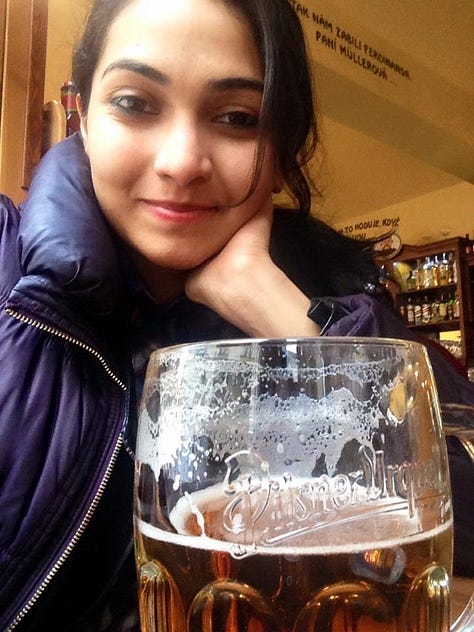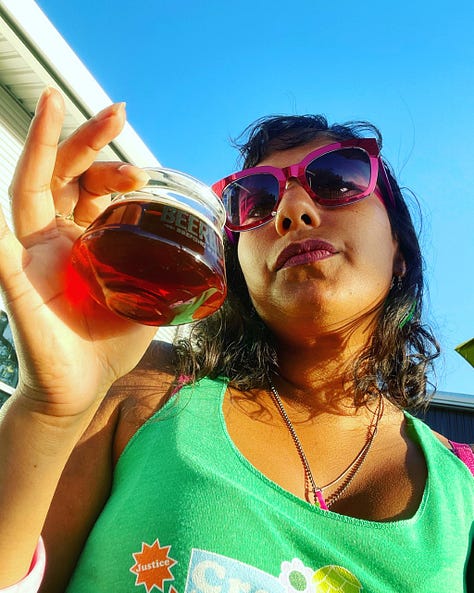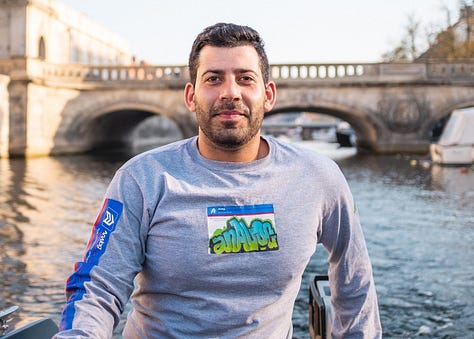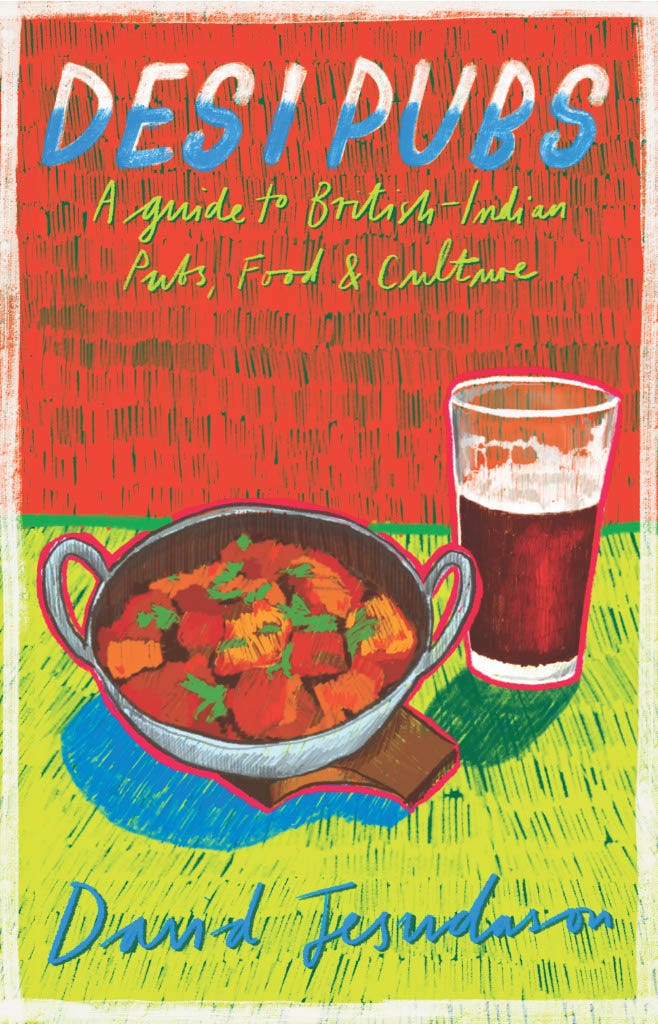'Don't repeat your name. I'll never remember it'
Three beer writers with Indian, Sri Lankan and Iraqi heritage take over this week's email sharing their familiar stories of prejudice, hostility and self doubt
Disclaimer: this newsletter often mentions beer and pubs. You do not have to read this if your life has been affected by substance abuse.
A lot of people have signed up to the free weekly email recently and there’s a question of how to support the work I put into these posts financially. I publish them to promote the book so please pre-order Desi Pubs - A guide to British-Indian Pubs, Food & Culture here and/or donate £3 here.
Saturday. I’d just spent a few days travelling to numerous desi pubs and bars, meeting empowered landlords - strong role models with a passion for community work - and I stepped off the train with a weekend of childcare in front of me. I checked my inbox, which I know I shouldn’t do in my free time, and there it was. Someone sending a slur so hideous - but so ubiquitous in my life - that I still was shocked. Numbed. Although, even when I was a child and was called that word frequently, it always had this effect.
But I don’t want to dwell on the words or how depressingly jarring it is for this type of racism to be sent in a week when the so-called culture wars were an unavoidable part of our lives. I’m just fed up with hate and how it manifests itself by actors of the state - people who have no agency over their lives, trying to kick those around them. Anti-racist campaigner Avtar Jouhl Singh summed it up: “We had 300 years of this in India, and that’s the reason I don’t blame the actors.”
Whatever your view of journalism is - no one deserves to receive hate mail - and it’s not as if I’ve ever sought to provoke or even give my own opinion as I’ve always made a conscious choice to avoid “hot take” writing. In fact, the piece that my attacker took such umbrage with was a celebration of a pub in a 1978 movie - that’s quite soft material to wet the bed over.
Instead of concentrating on hate, though, I want to give a platform for friends and colleagues in the same situation - brown writers who deserve to be celebrated by gaining huge amounts of agency in their lives through beautifully written, important work.
Predictably, I had to edit these three articles for repetition because the same experiences were often told with the battle between racists being far less important than the inner conflict of ingrained psychological issues, such as imposter syndrome.
This feeling of being a fake has, of course, racist undertones and is a direct consequence of the prejudice we’ve experienced from the moment we started socialising - or, especially in my case, spoken to by our parents. Nowadays I can win numerous awards and the only way I can rationalise the accolades is to diminish the whole process. “It’s a tallest dwarf competition.” “I only won this because there’s no diversity.” “No one reads my stuff.” I might be estranged from my mother but she lives on and on in my head.
But that’s enough about her and that’s enough about me. This is about three writers of colour who deserve more recognition.



Rashmi Narayan
I was born and raised in Bangalore, in southern India. My parents split up when I was a child, so it was my mum who looked after me, while she worked in HR. I studied journalism and was employed as a staff writer at a national daily paper. A year later, my mum wanted me to get out of Bangalore and told me to head to a city where I didn't know a soul. That's how I ended up in London.
I came here to do my master's degree in Journalism in 2010 and after I graduated, I struggled to find work as a journalist - I think it was because I was seen as an outsider. I did have a few freelance gigs but not enough to keep me afloat. I worked in a corporate job for eight years, saving up but a year after the first lockdown, I decided to start writing again and now I'm a freelance journalist.
Blue Moon and Leffe were the first beers I loved. I first tried them in London when I was at university. It sounds strange now we’re used to craft beers but I began a conversation with a friend over my fascination with a tiny wedge of orange in my beer and the drink’s general zestiness.
A drunk, friendly, elderly man overheard this and started talking about how he loved shandy - it made me understand that people here enjoyed beer in different ways. Leffe got me into another conversation with the bartender about monks, abbeys and monasteries and the history of blonde beers. Both these beers made me think about beer and the world differently and this is when I realised I wanted to dive deeper into the industry.
There should be more conversations on race/racism but putting myself in the story depends on the subject and publication. Often when I'm talking about beer, I enjoy including anecdotes from my life in Bangalore. Representation is getting better than what it was about 10 years ago - when journalism in the UK scared me due to a lack of diverse voices.
I've been fortunate to not have faced racism and sexism in comparison to many of my friends and colleagues. I do face a lot of boorish comments when I tell people I'm from India but the most alarming was someone at a networking event saying: "Oh blimey, don't bother repeating your name. I'll never remember that."
As a person of colour with an unfamiliar name, I feel like I constantly have to prove myself and, as someone who constantly suffered from imposter syndrome, I used to handle rejection very badly.
At first I'd dwell on it, read my pitch several times and wonder what went wrong. Over time, I realised that a 'no' now from one publication could mean a 'yes' somewhere else at another. I’d feel more comfortable if more writers from different backgrounds were commissioned and those in the industry had more awareness of unconscious biases.
I’m most proud of this piece I wrote for Burum Collective on Bangalore's beer history and here's a link to my work.
Samer Khudairi
I was born in Fort Myers, Florida but grew up just outside of Boston, Massachusetts to Iraqi parents who arrived in the US in the 1970s and 80s. My writing career started in lockdown when I was living with my folks - if I had anything printed, I would leave it on a table in a family room, including my first cover story in a Boston alt-weekly which I was very excited about.
But my parents aren’t thrilled that I write about beer and won’t brag about it to the rest of my extended family (most are abstinent on religious grounds). My friends on the other hand, think it is very neat and DO tell me to boast about it more.
The first beer I ever drank was a Coors Light. I had this idea that beer was like an even more delicious version of root beer and that’s why adults became ‘elated’. Because of this, my first sip of beer was so awful that I mixed it with Cola to dilute the taste.
Other beers that stood out at an early drinking age include Newcastle Brown, Magic Hat Variety Packs, Stone Ruination, Long Trail, and some other regional New England craft breweries. There have been many beers that changed the way I look at the world, which is the beauty of beer. I don't keep a log of the beers I drink, and the most memorable ones are frequently based on the moment and the company I’m with.
There have been unnecessary challenges for me to be able to take pride in my identity - partially due to my personality, partially due to the realities of the world. I wish I didn't feel doubt or shame about who I am but there has been a constant need to code switch that has led me to only recently beginning to unpack that.
An example is changing my name to “Sam” for convenience sake when ordering food or booking a reservation. I do this to present myself in a more appealing, professional manner in order to navigate bias. Changing my name or identity when applying for jobs to appease or combat inherit racism isn’t something I’m proud of but I have done this in the past
Thankfully, writing has helped. I would rather not draw attention to myself and I used to want to be an anonymous creative type, but I think that avoidance wasn't helping me better myself.
The goal of being a good writer is to write your next best piece - in theory - but being one's own worst critic also comes with the territory. Good writers read. ALOT. And not just by other writers in their field (do that, certainly) but also they should read everything. Advertisements. Shampoo bottles. Long books. Poetry.
Do compliment writers if you read their work and enjoy it. Don't be an asshole if you don't like the work. Share work. Share stories. Support and encourage one another. It goes a long way.
This piece is one I am very fond of because it was one that really took a lot of work between travel, research, and editing. And here’s a link to my work.
Ruvani de Silva
I was born in Swindon, which was not a good place to be a person of colour in the 1980s and 1990s. My mother was a librarian and my father a civil engineer, both had internalised colonial mindsets. My mother simultaneously railed against the racism of the mediocre white middle class while indoctrinating me that anything South Asian, from curry to ‘Bollywood’, should be eschewed.
I always loved writing, a hobby both my parents encouraged, but when I announced my intention of making this my profession their support immediately evaporated. My family continues to look down their nose at my writing and ask when I’ll get a ‘real job’.
Beer writing found me. While I loved craft I was actually contemplating a move into wine and did a WSET. I began to learn more about beer and become more passionate about it, started working and then running beer events and tours, and when I moved to Texas I wanted to find a way to share my love for the region’s beer, so I just started writing – first blogging then pitching to publications.
As I was writing, I began looking around at the stories that were being told and who was telling them, and it was when I noticed the huge dearth of beer advocates who looked like me that I began to start writing about diversity and inclusion and South Asians in beer.
I describe myself as British Sri Lankan. While both my parents are Sri Lankan, I was born and raised in Britain and exposed predominantly to British culture. I didn’t visit Sri Lanka until I was 24 so my knowledge and understanding of my heritage is shaped primarily by adult experiences.
I have experienced racism my whole life in every form, from overt aggression, name-calling and violence to insidious gatekeeping and performative friendship. At this point in my life I’m comfortable to call it out whenever I see it, but that wasn’t always the case.
Beer writing was hard to break into and as I try to find work outside the beer world, my experience so far is that beer writing is not too different to other forms of writing – quite how much I can attribute to the way many South Asian immigrants are discouraged from creative careers and how much is due to cultural gatekeeping is a very big question.
For me, the most frustrating and infuriating instances of racism I’ve experienced as a writer have involved the inference that South Asians don’t experience racism in the same way as other marginalised groups and are, therefore, not qualified to call it out.
There are a lot of people who still aren’t comfortable with a South Asian woman drinking beer, let alone writing about it. It’s exhausting being on high alert for those people and situations – even though they don’t happen that often you always have to be ready to deal with them. It also makes you wary around new people and places.
I started my South Asian Beer Club project as a way to connect with other South Asians in the beer world, collaborate and amplify each other’s work and it has helped me make connections with South Asians in the UK, US and the Subcontinent whose stories I’ve been able to give a platform to. Sharing the passion and talent in the South Asian beer community is really important to me because visibility is half the battle towards acceptance.
I’m especially proud of my first longform piece for Good Beer Hunting. It’s about South Asian women in the beer world and it was a privilege to share the stories of the women I connected with and our similar experiences. And here’s a link to my work.


